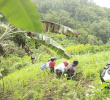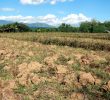Bt Talong is a genetically-engineered eggplant that produces a toxin against a fruit and shoot borer (FSB). BT (Bacillus thuringiensis) is a soil bacterium whose genes are inserted to the eggplant to produce toxins against FSB.
By DANILDA L. FUSILERO
Davao Today
MLANG, Cotabato, Philippines — Fearing for environmental and health hazards against public consumers, sustainable agriculture advocates here sought to stop the endorsement by local governments to support the commercial production of genetically-modified Bt Talong.
In an interview with Davao Today, Ramer Tandoy of the Magsasaka at Siyentipiko para sa Pag-unlad ng Agrikultura (Masipag) said that Mahayco, a subsidiary of the transnational Monsanto Corporation, is seeking an endorsement following the expiration of the company’s field testing permit in June this year.
The field testing, according to Masipag, pushed through despite widespread opposition from local, national and international groups that advocate organic farming and environmental protection.
Bt Talong is a genetically-engineered eggplant that produces a toxin against a fruit and shoot borer (FSB). BT (Bacillus thuringiensis) is a soil bacterium whose genes are inserted to the eggplant to produce toxins against FSB. It originated in India, the home of its proponent, the Mahayco company.
Last May, the Supreme Court issued a Writ of Kalikasan after Masipag, Greenpeace Southeast Asia-Philippines and other environmental groups petitioned for the stoppage of the field trials of Bt talong.
Professor Vilma Gonzales of the Bantay Konsumo here also questioned Mahayco’s plan to commercialize the production of Bt Talong. The company, according to her, “violated pertinent provisions on public consultation requirement and has kept their silence on the arguments we presented.”
Gonzales said, the commercial production and consumption of the controversial Bt Talong should not be allowed without safety measures to assure public health.
“Allowing them to mass produce Bt Talong is tantamount to risking public health,” Gonzales said adding that the public have limited knowledge on Bt Talong.
The Citizens’ Food Watch (CFW)-Cotabato, a network of civil society organizations for sustainable agriculture and food security also opposed the field testing and commercialization of Bt Talong in the province.
CFW believes that the genetically-modified Bt Talong of the Mahayco-Monsanto corporations will have adverse effects on the environment and public health.
Masipag said many independent studies proved that genetically-modified crops have adverse effects both on human health and environment.
“They are forcing us with a technology that poisons us,” Tandoy lamented.
Tandoy said, the commercialization of Bt Talong and any other genetically-engineered crops will eventually render inutile the Republic Act 10068 or the Organic Agriculture Act of 2010 which promotes organic farming initiatives.
“The challenge is not to kill the law but how to strengthen its enforcement because it supports farmers the practice organic farming,” Tandoy said.
Masipag has long been lobbying for a parallel ordinance on organic farming with incentive mechanisms for farmers.
The Philippine Network of Food Security Programmes (PNFS), a network of 25 organizations advocating sustainable agriculture and community-appropriate technologies, earlier warned of possible commercialization of Bt Talong. Should this happen, it said, “the Philippines could be the first country to allow the commercial cultivation of Bt Talong.”
In a statement, the PNFS said that the public should be well-informed over the crop, adding that, there were no adequate tests to determine safety of friendly insects; possibility of inducing pest resistance and emergence of new pests; and the issue on health hazards.
The Third World Network (TWN), an international research and advocacy organization involved in trade, environment and agriculture issues, issued a position paper on Bt Talong in February 2011. It questioned the legal basis of the field testing of the crop in the premises of state-owned University of Southern Mindanao in Cotabato province.
TWN cited the Bt Talong project proponents’ failure to abide rules on public consultation and conduct of standard risk assessment based on Department of Agriculture Administrative Order No. 8. It added that the Philippines, as one of the signatory of the Cartagena Protocol on Biosafety is committed to “ensuring that the development, handling, transport, use, transfer and release of genetically modified organisms are undertaken in a manner that prevents or reduces the risks to biological diversity and human health.”
TWN also belittled proponents of genetically-modified (GM) farming technologies which promised high yield as a solution to world poverty and hunger. It said, “Hunger is fundamentally a social, political and economic problem which the GM technology cannot address.”
It cited the four-year comprehensive study on world agriculture entitled the International Assessment of Agricultural Knowledge, Science and Technology for Development, penned by more than 400 scientists and development experts from 80 countries. The study concluded that genetically-modified crops have little to offer for global agriculture.
The study recognized sustainable farming practices and concepts like Integrated Pest Management, Organic and Agro-ecological farming systems as sustainable strategies that have registered increases in yields and secure food supply, the TWN statement stated. (Danilda L. Fusilero/davaotoday.com)
World









